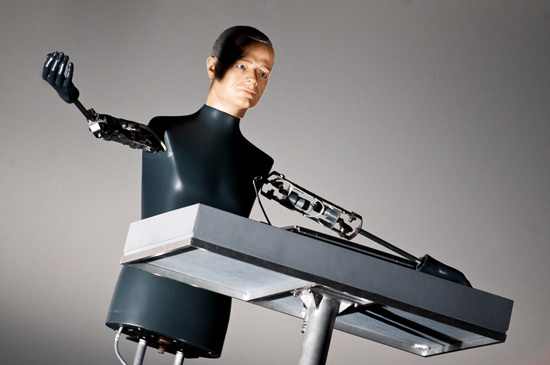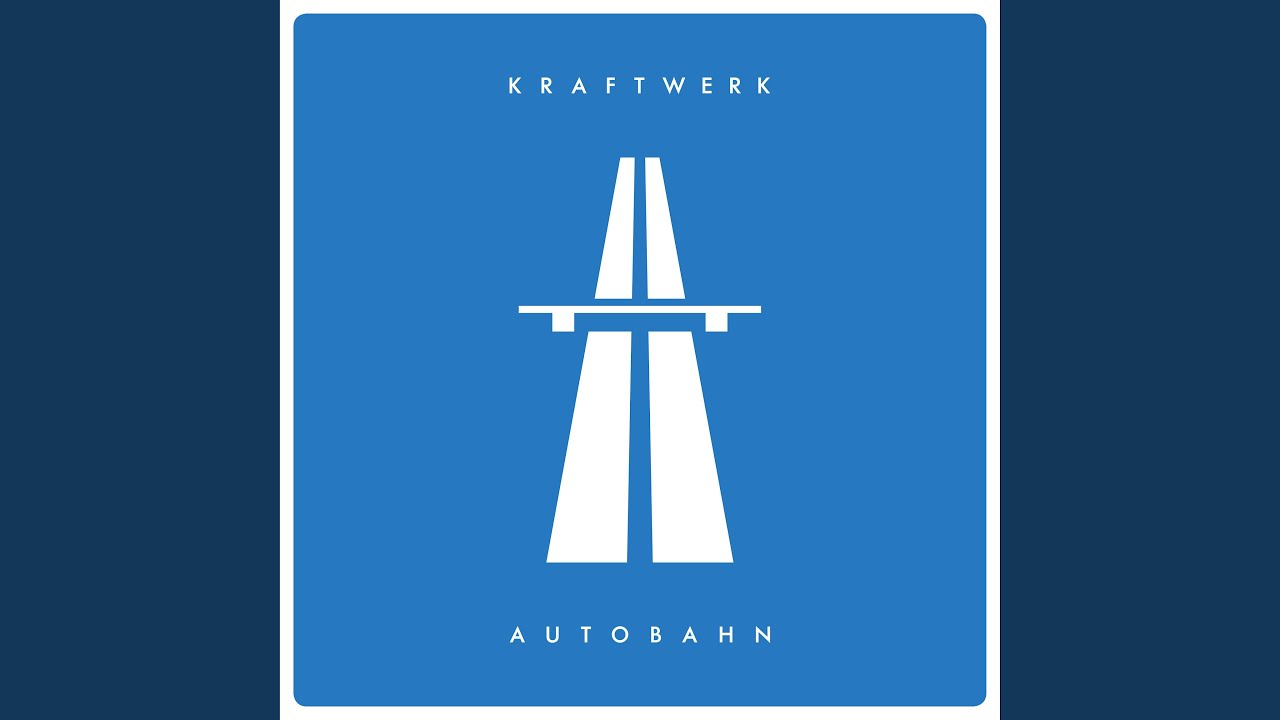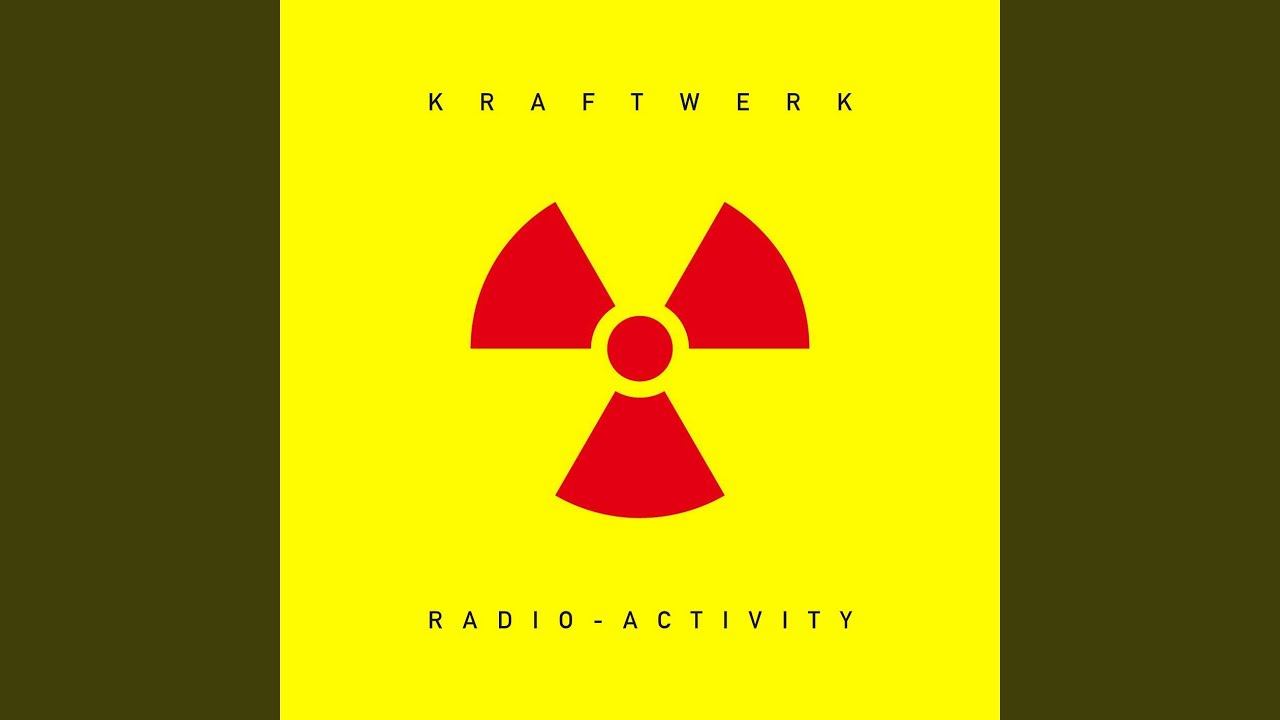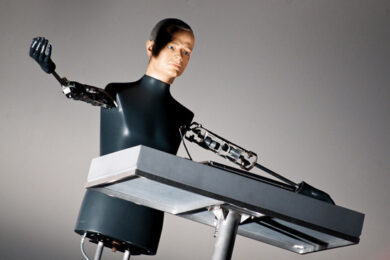Originally published on 6th February 2013 this article was republished on 6th May 2020 to mark the passing of Florian Schneider
1) On the 1975 Autobahn tour, Kraftwerk were supported by a folk singer from Somerset called AJ Webber. “They weren’t the easiest [people] to talk to, probably due to the language barrier,” she writes, via email. “But they were polite and reasonably welcoming. They drew a certain ‘following’! We warmed to each other as the tour went on.” She also supported Frank Zappa (“I loved Frank!”) supporting bigger bands, as it was just her and her acoustic guitar, so no fancy changeovers were needed in the interval. She also seems to remember that one of them said they had ancestry that went back to Beethoven, but can’t remember the details.
2) In 2000, the famously interview-shy Florian Schneider was interviewed indeed – wearing a fake moustache and smoking a cigar, by a man dressed up as Che Guevara. A transcript, translated, follows (with huge thanks to Paul McGee):
CvG: Welcome to my show. My guest today is the honourable Don Schneider. How did it all begin?
DS: In 1947 in Mexico City, I devised the concept of humanoid sequencers. If a musician in my band was incapable of playing the precise rhythm or sound, he was fired. You understand?
CvG: In the studio?
DS: Yes, and also at the shows, at almost every show. In the 70s, there was said to be a German group even more extreme and radical.
GvC: Kraftwerk, maybe?
DS: I think so. They eliminated the musician completely by using sequencers, rhythm machines and computers.
GvC: Aaaah, Carlos Bartos and W. Flür!
DS: Possibly, I don’t remember. When they composed, they would take away almost everything until only the desired sounds and rhythms remained, to achieve the perfect result.
CvG: And Senor Coconut?
DS: Virtually a similar revolution in digital and electronic rhythms.
CvG: Thank you, Don Schneider!
Schneider also appeared as a bassist called “Fred Schnitzel” on a German TV film in 2001. Fellow German electronic legend Klaus Schulze also had a cameo as the player of the Vox "Continental" organ.
3) Hardcore fans of electronic music will know this already, but Schneider put his first analogue vocoder on eBay in 2005. Made in West Germany’s national institute for science and technology, this Barth Musicoder had been customised for Schneider, but it had been gathering dust in the basement of Kling Klang for years. It was first used on ‘Ananas Symphonie’ (Pineapple Symphony), the final track on 1973’s Ralf und Florian; the next track Kraftwerk made after that was ‘Autobahn’. Its starting price at auction was $500, but it was finally won by Daniel Miller, CEO of Mute Records. The damage? $12,500.
4) Schneider also owns one of the earliest-ever electronic instruments. Not long after selling the Musicoder in 2005, Schneider found out that there were some primitive electronic instruments in a cellar below an observatory at the University of Bonn. After going there, he found an unfinished prototype for a modern vocoder, made by German physicist Werner Meyer-Eppler, who died of kidney failure in 1960. This meant that a vocoder had been successfully created in the decade before Robert Moog and Raymond Scott’s revolutionary machines.
5) Two of Kraftwerk’s most famous sound effects came from a speaking-aid for deaf-mute children, and a popular toy. The Vortrax was invented in Detroit in the early 1970s. A hand-held machine that looked a bit like a pocket calculator, it produced the distorted vocal choir sound that can be heard on 1975’s ‘Uranium’, which was later sampled in the opening build-up of New Order’s ‘Blue Monday’. The tones in 1981’s ‘Numbers’ came from a Texas Instruments Speak & Spell; the Japanese lyrics on the album came from a Texas Instruments Language Translator. Kraftwerk didn’t have a sampler at that time, so recorded all these sound effects live. [The last three facts come from Dave Tompkins’ brilliant book How To Wreck A Nice Beach: The Vocoder From World War II To Hip-Hop – treat yourselves.]
6) A snippet of Kraftwerk’s ‘Autobahn’ was used as the theme tune to a 1978 BBC children’s drama, Out Of Bounds. Two teenage gymnasts cartwheeled in slow motion to it over the opening credits.
7) On their 1975 Autobahn tour, Ralf and Florian would share one room, with Karl and Wolfgang sharing another [Karl and Wolfgang were already flatmates back in Düsseldorf]. On several occasions, Ralf and Florian stayed at a different hotel to the rest of their entourage.
8) Florian’s father was the architect of Germany’s first multi-storey car park – oh, and Bonn Airport. Paul Schneider-Esleben’s buildings were designed in a modernist style, prioritising the use of concrete and glass. (Click here for a great picture of Florian’s father designing the airport.)
9) Kraftwerk was a provocative name for a band in early ’70s West Germany. A grass-roots ecological movement against the building of Kraftwerke (power stations) was briefly popular. Naming your band after one, and putting a huge picture of another on your first record’s gatefold, was just a little bit punk.
10) Ralf Hütter did meet Michael Jackson in the 1980s, to discuss a collaboration that never materialised, according to Wolfgang Flür. It has long been rumoured that Hütter arrived in Jackson’s US HQ to be met by Wacko Jacko döppelgangers, just like Kraftwerk’s robots. Hütter denied this in a 2005 interview. However, Flür says that he was not invited to this meeting, and was similarly sad not to be invited to meet David Bowie and Iggy Pop in 1977. Oh, and Schneider took Iggy Pop asparagus-shopping during that meeting. Curiouser and curioser. Das ist Kraftwerk.





